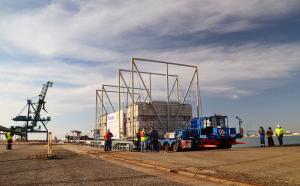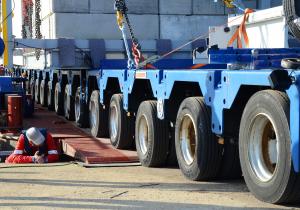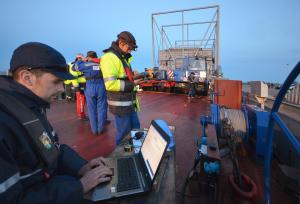Welcome on board!
It's like driving a car onto a ferry. But it takes much, much longer and it's incomparably more delicate and complicated.
On Friday 28 March, on a remote wharf at the southwest end of the Fos-sur-Mer industrial harbour near Marseille, the loading of the ITER mockup convoy onto a barge took more than eight hours.
Progress was measured millimetre by millimetre as the weight of the 800-tonne monster trailer was gradually transferred from the solid ground to the water-borne combination of barge and pontoon.
Axle line after axle line (and there are 22 double pairs of them!) the trailer and its dummy load of stacked concrete blocks were slowly driven onto the pontoon as electronic calculators adjusted the barge's ballast in real-time.
Each time an axle line transferred its load from the ground to the barge a long pause (5-20 minutes) ensued. Balance was checked and calculators activated the filling and emptying of the ballast tanks to compensate the imperceptible, but potentially dangerous, pitching, tossing and rolling of the barge.
By the time the sun had set on the wharf, the trailer had progressed approximately 40 metres and its load had been safely transferred to the barge.
"This last phase is the most delicate," explained Alain Spatafora, the maritime expert commissioned by the ITER Organization and logistics provider DAHER, and Bernard Bon, DAHER head of convoy. "The centre of gravity of the trailer must now be perfectly aligned with the centre of buoyancy of the barge."
On board, as bubble levels were laid on the deck to verify the perfect horizontality of the barge, the crew was busy making the last adjustments. Captains and sailors of the Compagnie Fluviale de Transports (CFT) are used to transporting exceptionally heavy loads, but at 800 tonnes this one exceeded anything they had experienced.
The night was falling when, in conformity with port regulations, Marseille harbour stevedores climbed on board to lash down the trailer and its load, marking the end of the operation.
The barge spent the weekend in protected docking (a strong north wind was expected during the night) and on Monday afternoon, weather permitting, it is expected to leave Fos, navigate into the narrow Caronte Canal through the town of Martigues and cross the inland sea Étang de Berre.
The trailer will then be unloaded at Port-de-la-Pointe on the north-western shore of the Étang, before commencing its slow progression towards the ITER site where it is expected at around 6:00 a.m. on Friday 4 April.




